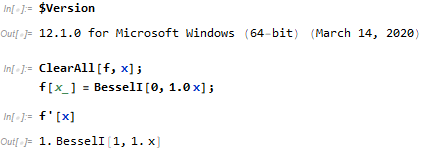Bug introduced in 12.0 or earlier. Fixed in 13.2 or earlier.
In Mathematica 12.0, I run the following code:
f[x_] = BesselI[0, x];
f'[x]
which returns BesselI[1, x] as expected. But if I enter
f[x_] = BesselI[0, 1.0 x];
f'[x]
I get
0.5 (BesselI[1, 1. x] + BesselI[1, 1. System`Private`DerivativeX[1.]])
Moreover, D[f[x],x] returns the expected result. I have tried quitting the kernel with no change. Is this a bug, or is something messed up with my installation?


f'[x]to me. $\endgroup$D[f[x], x]instead off'[x]Not sure why. could be a bug. $\endgroup$1.0 x, it is reasonable to expectBesselI[0, a x]whereais given an inexact value. In version 12, any inexact value foraproduces the behavior shown in the OP. $\endgroup$Setin definitions of special functions is just a "bad approach" even though it would be nicer if there were no such weak points. $\endgroup$LaplaceTransform[Sin[1], 1, 1]is accepted with no error and it returns1/2! $\endgroup$